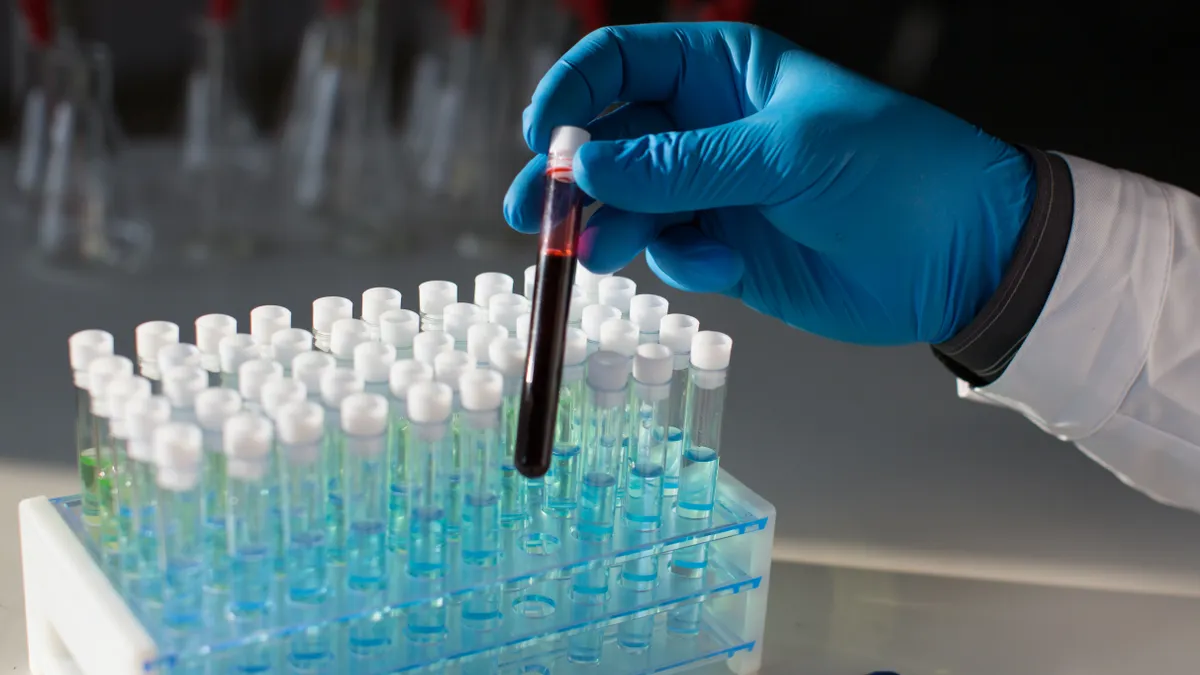Dive Brief:
- Freenome published topline results this week from a study of its blood-based test for the early detection of colorectal cancer, though the data fell short of expectations and rival diagnostics.
- The test achieved sensitivities of 79.2% in colorectal cancer and roughly 15% in advanced adenoma at 90% specificity in a study of almost 50,000 participants. Investors surveyed by TD Cowen analysts before the readout expected Freenome to report sensitivities of 86% in colorectal cancer and 23% in advanced adenoma.
- Cowen and Evercore ISI analysts framed the results as positive for Exact Sciences, which sells a stool-based colorectal cancer screening test.
Dive Insight:
Freenome has spent the past decade developing and testing ways to analyze DNA, RNA, proteins and more in blood samples to detect signs of tumors. The initial goal is to increase uptake of colorectal and lung cancer screening by making it easier for people to get tested. In the colorectal cancer space, people currently need to provide stool samples or undergo colonoscopies to get screened.
The company ran a prospective, registrational study to validate its test in colorectal cancer. The study met its primary endpoints but the sensitivity fell short of analyst expectations and the bar set by Exact Sciences’ stool-based Cologuard.
Exact Sciences’ next-generation Cologuard test achieved 94% sensitivity at 91% specificity for detecting colorectal cancer in a pivotal trial last year. Freenome reported 79.2% sensitivity at nearly 92% specificity in colorectal cancer. Adjusting the specificity to 90%, the cut-off used by the Centers for Medicare and Medicaid Services, did not affect Freenome’s sensitivity in colorectal cancer and had a small boost in advanced adenoma.
Cowen analysts said Freenome’s results are good news for the incumbent Exact Sciences and for Guardant Health, which is developing a rival blood-based screening test. Investors sent Guardant shares down 27% when the company reported 83% sensitivity in colorectal cancer in 2022. Cowen analysts compared Guardant’s data favorably to Freenome’s results but questioned if its test can have a commercial impact.
Evercore analysts showed that the sensitivity of the tests in advanced adenoma, a precursor to colorectal cancer, could shape the views of the U.S. Preventive Services Task Force (USPSTF), an expert group that recommends standards for preventive services like cancer screenings. The Freenome and Guardant blood tests achieved 12.5% and 20% sensitivity in detecting advanced adenomas, respectively, compared to more than 40% for Cologuard.
The analysts said the variation in sensitivity “will make a big difference” in the USPSTF’s calculations of life years gained. Life years gained using the blood tests will be at least 20% lower than for Cologuard, the analysts said, assuming testing once every two years.
Cowen analysts also identified the USPSTF as the main barrier to widespread commercial use of Freenome’s test.
“We feel [Freenome] can secure FDA coverage and Medicare reimbursement with these data but USPSTF approval is far more uncertain as blood is a new paradigm with weaker performance — though has potential for higher compliance to target the 60M unscreened population,” the analysts wrote.










